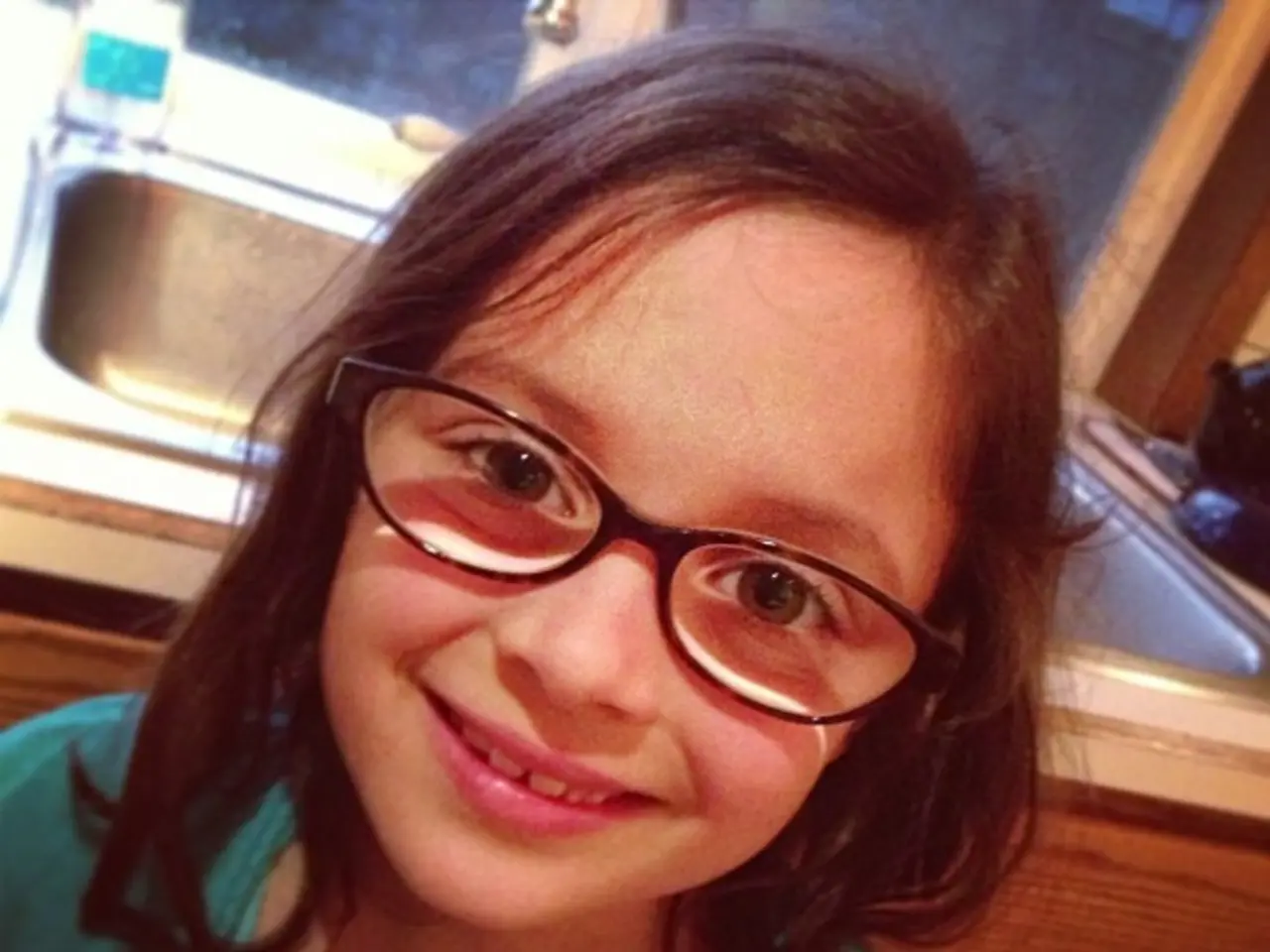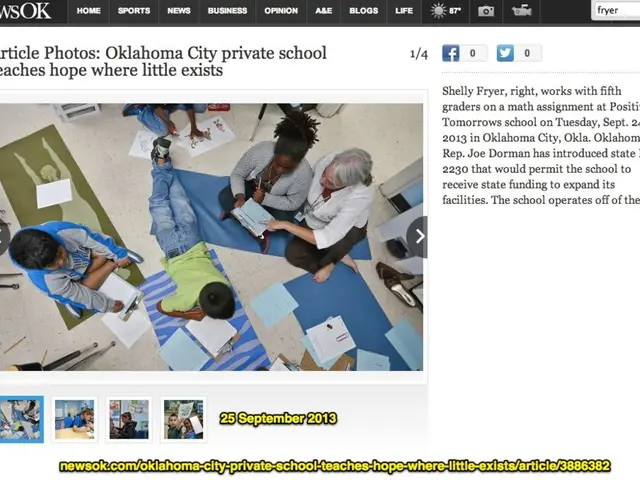Enhancing Child Vision Assessments: A Detailed Analysis (Case Study)
In an innovative approach to promote eye health among children, a child-to-child vision screening project has been initiated in schools across New Zealand. The project, known as the Vision 20/20 Project, aims to move vision screening away from the health system and into the hands of children and teachers.
The project, which has been underway for the past two years at Tahuna Normal Intermediate, has seen 600 year 7 students participating in peer-to-peer vision testing. The students are not just screeners, but also learners, with their education focusing on fair testing, eye health, eye conditions, and understanding individual needs related to vision problems like myopia or hyperopia.
The Vision 20/20 Project has been praised for its collaborative approach, with researchers commending the teachers' scientific understanding, pragmatic educational, and leadership approaches. The project has also been a great opportunity for community science and STEAM education.
The students have even created a video demonstrating how to bring peer-to-peer testing into the classroom. The project's Google Slides presentation balances anatomy and health of the eye, leading to open-ended questions from students about eye behaviour.
Teachers are in an ideal position to identify and respond to children whose learning is impacted by the need for glasses. However, challenges such as finding enough space for testing, managing the testing schedule, and encouraging children to visit an optometrist remain.
The child-to-child vision testing involves groups of three students, where each student takes turns being the tester, the recorder, and the testee. The project is based on the concept of child-to-child vision screening, which empowers children to take responsibility for testing their own vision.
The Vision 20/20 Project received funding through Otago Science into Action and the Participatory Science Platform, which is part of the Curious Minds initiative. The project was also supported by the government's national strategic plan for Science in Society, A Nation of Curious Minds - He Whenua Hihiri i te Mahara.
Despite extensive searches, no explicit details have been found on the status or outcomes of this project in terms of its impact on eye health awareness among children and parents. However, it is clear that the project is making strides in integrating vision screening tests with teaching and learning opportunities for students.
The World Health Organization's World report on vision (2019) highlights the importance of addressing vision impairment, estimating that there are 949.4 million people in the world who need glasses and do not have them. The Vision 20/20 Project, in its own way, is contributing to bridging this gap in New Zealand schools.
[1] Early Childhood Research Aotearoa. (n.d.). Early childhood research in New Zealand. Retrieved from https://www.ecresearch.org.nz/
[2] Down Syndrome Association of New Zealand. (n.d.). Cerebral visual impairment. Retrieved from https://www.dsanz.org.nz/
[3] Ministry of Health. (n.d.). Child health research. Retrieved from https://www.health.govt.nz/
[4] Kenya Ministry of Health. (2020). Vision screening in Kenya. Retrieved from https://www.health.gov.ke/
[5] International Agency for the Prevention of Blindness. (n.d.). Global initiatives on vision. Retrieved from https://www.iapb.org/
- Science plays a crucial role in addressing various medical conditions like chronic kidney disease, COPD, type 2 diabetes, and cancer through rigorous research and therapies and treatments.
- Educating individuals about workplace-wellness and fitness and exercise can contribute to managing chronic diseases like diabetes and improving cardiovascular health.
- Eye health is essential for overall learning and development, making it essential to identify and address conditions like myopia or hyperopia at an early stage.
- Education is not limited to learning in the classroom; projects like the Vision 20/20 Project integrate health education into teaching and learning opportunities.
- The Vision 20/20 Project encourages personal growth and mindfulness by teaching children how to take responsibility for their own eye health.
- Hearing problems should also be a focus of health and wellness initiatives, as hearing loss can impact productivity, career development, and even social relationships.
- Skin care and skin conditions are another aspect of health education that should be incorporated into school curriculum, with psoriasis being a common skin condition that can greatly impact the quality of life.
- Awareness of neurological disorders like Alzheimer's disease, multiple sclerosis, and migraine is crucial for early diagnosis and treatment, as they can have serious implications for mental health.
- Addressing autoimmune disorders like rheumatoid arthritis and its impact on daily life is crucial for promoting wellness and personal growth.
- Nutrition and weight management play a significant role in managing digestive health, as an unhealthy diet can lead to issues like obesity, which can exacerbate other health problems.
- Breast cancer awareness and education is essential for early detection and treatment, as well as for encouraging women to conduct regular self-examinations.
- Navigating the job search and career development process requires understanding various aspects of education and self-development, including online education and learning opportunities.
- Lifelong learning and skills training are essential for goals setting and personal growth, as they ensure individuals remain relevant in today's fast-paced world.
- Leadership and productivity are crucial skills for success in the workplace; mindfulness practices can help individuals improve their focus and productivity.
- Proper medical care and Medicare coverage are vital for addressing chronic diseases and other health issues, especially for individuals with limited resources.
- CBD is gaining popularity as a natural treatment for various health issues, such as anxiety and inflammation, but its effectiveness and safety require further research.
- In addition to conventional treatments, alternative therapies like meditation and stress management can have a positive impact on mental health and overall well-being.
- Early childhood research highlights the importance of providing children with a healthy and nurturing environment that supports growth and development, including eye health and vision screening.
- Down Syndrome Association of New Zealand offers support and resources for individuals with Down Syndrome, including information on cerebral visual impairment.
- The Ministry of Health in New Zealand has various resources available for parents and children, including information on child health research and opportunities for STEAM education.
- Collaboration with organizations like the International Agency for the Prevention of Blindness can help address global issues like vision impairment and ensure that people have access to the health care they need.







